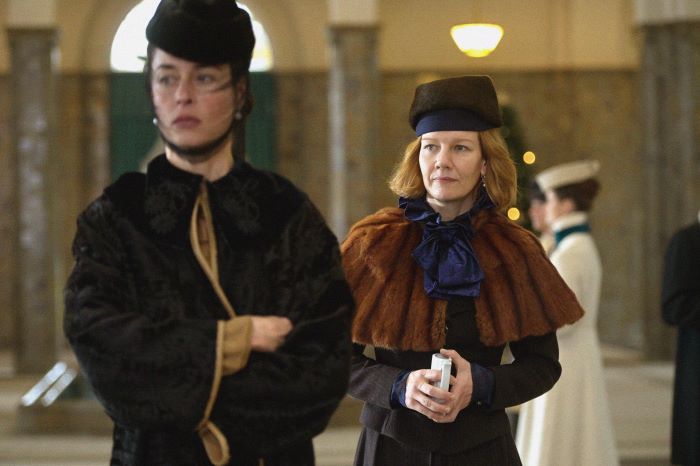Elisabeth of Austria-Hungry (1837-98) has been the subject of plays, operettas, novels, a Netflix series, along with several movies, the most famous of which was the soapy “Sissi” trilogy made in the 1950s, with a young Romy Schneider, that covered the romantic entanglements of the princess and, in her first few years on the throne, the empress.
In 2022, Austrian director Marie Kreutzer’s Corsage focused on an eventful year in the empress’s life, when Elisabeth (played by the great Vicky Krieps) turned 40 and decided she didn’t want to accept that she was a mere ornament of her husband, the Emperor Franz Joseph. On the heels of Corsage is yet another film about Empress Elisabeth. German director Frauke Finsterwalder’s Sisi & I concentrates on the relationship between Elisabeth (Susanne Wolff) and her new handmaiden, Irma (Sandra Hüller), a Hungarian countess. Told mainly through her eyes, the regal Irma subjugates herself to her temperamental new mistress, whom she meets after arriving on the Greek isle of Corfu, where Elisabeth is staying while separated from the emperor.
Irma, who has a healthy appetite, soon is eating as little as the weight-conscious Elisabeth, who persists on broth and seemingly little else. Irma also forsakes her own lacy style of dress to match Elisabeth’s preference for Japanese-influenced clothing. Her infatuation, though not completely reciprocated, is used by Elisabeth to get what she wants from the countess—steadfast loyalty, even though their relationship becomes codependent as they get closer and more familiar with each other. (They share a loathing for men: Irma says she cannot stand being with a man, which is why she remains unmarried, while Elisabeth cannot stand having sex, even though she does partake.)
Finsterwalder structures her film by having Elisabeth and Irma’s relationship develop and deepen while various men enter and leave the story—from Archduke Ludwig Victor (who puts on outdoor theatrical performances for the empress that star himself and Irma) to Captain Smythe (who oversees the horses for the Earl of Spencer, the empress’s English friend). There are also appearances by the emperor himself, who wants Elisabeth to return with him to rule the kingdom and whose rape of his wife—heard by Irma from her nearby room—triggers a final, fateful order by Elisabeth to her faithful lady-in-waiting on a late summer day in Geneva, an act that Finsterwalder uses as a fictional substitute for what really happened to the empress.
Like Corsage, Finsterwalder intentionally uses anachronisms to underline the emotional truths of the relationship between the two women as some historical facts are jettisoned. That a valuable and welcome feminist viewpoint is espoused is no surprise, but more strangely, both films traffic in musical anachronisms. Yet Finsterwalder goes further, having only female voices singing on the soundtrack, including Dory Previn, Nico, and the band Portishead. Irma even sings along to Previn’s tune “The Lady with the Braid” at one point. Then there’s a cover of a T-Rex song, “Cosmic Dancer,” sung by none other than Hüller herself, as Irma walks along a cliffside in the film’s final moments. (The director nods to the film’s time period by including an excerpt from a piano piece by Clara Schumann over the end credits.)
Maybe it’s because I saw Corsage first, but the feminist focus and musical anachronisms don’t have the same heft in Sisi & I. While Finsterwalder spins her wheels dramatically after a promising first hour, the sequences involving the emperor and the English captain feel more cursory than authentic. In addition, the blatant lizard symbolism is crushingly banal. Still, Finsterwalder has a good sense of visual proportion as she and her excellent cinematographer Thomas W. Kiennast conjure plush vistas without turning them into picture postcards.
Finsterwalder is also blessed with two formidable performers. Both Wolff and Hüller create fully realized characters without ever making them implausibly larger than life. Hüller, who was recently Oscar nominated for Anatomy of a Fall and won acclaim in Toni Erdmann several years ago, shows a welcome light touch in her many scenes with the always winning Wolff, whether they’re tripping after eating hashish while in Algiers or discussing men while horseback riding in England. The film is at its best when only the two women are onscreen, sharing intimacies without the trappings of royal life.







Leave A Comment